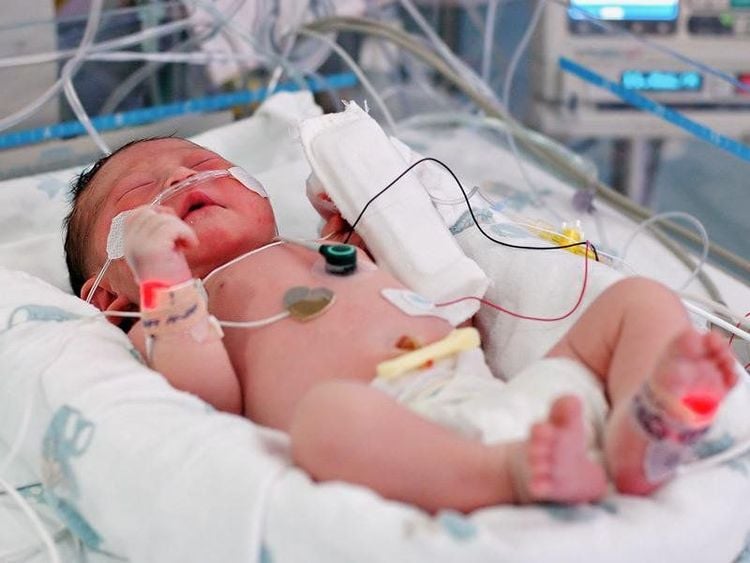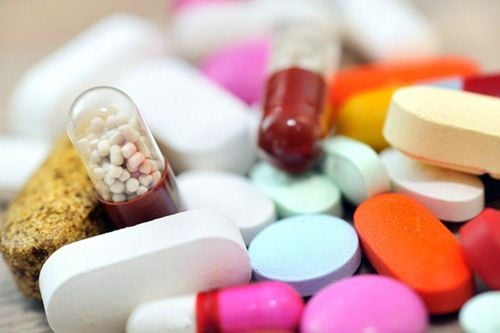This is an automatically translated article.
The article is professionally consulted by Master, Doctor Nguyen Minh Tuan - Pediatrician - Department of Pediatrics - Neonatology - Vinmec Danang International General Hospital.Polycystic kidney disease is caused by abnormal renal differentiation that is present in embryo. And this kidney may lose function completely or partially. Polycystic kidney disease can lead to serious complications such as infection, kidney failure, high blood pressure...
1. What is polycystic kidney dysplasia?
Polycystic dysplastic nephropathy is relatively common, occurring in 1 in 300 live births. Most cases occur sporadically, although familial cases are rare. Polycystic kidney disease always manifests as multiple enlarged cysts occurring in one kidney, causing the kidney to enlarge and lose function over time. The cysts are round sacs that contain fluid. The cysts vary in size and they can grow very large, possibly destroying the kidney.Polycystic dysplastic nephropathy can be accompanied by urogenital malformations such as vesicoureteral reflux, ureteral junction stenosis... The disease can cause serious complications such as urinary tract infections. urine, high blood pressure and kidney failure.
2. Symptoms of polycystic dysplastic kidney disease
Most children with polycystic dysplastic kidney disease have no symptoms. The cysts, at first, have plenty of normal kidney tissue to filter the blood. By the time symptoms appear, one in four children will have problems, and most of the symptoms are similar to those of adults. Symptoms of polycystic dysplastic nephropathy in children include:Hip or back pain Urinary tract infections Kidney stones. High blood pressure, but this usually causes no symptoms. However, it is still necessary to monitor the child's blood pressure to have a timely treatment plan.

3. Diagnosis of polycystic kidney disease
To diagnose polycystic kidney disease, tests such as:Ultrasound: In ultrasound, a transducer device is placed on the body and emits ultrasound waves that are reflected back to the transducer. And the image from the ultrasound waves will be transmitted to the computer screen. At this point, the doctor can observe the morphology of the kidney. CT scan: When the patient lies on a moving chair, X-ray beams pass through the body to help the doctor see a cross-sectional image of the kidney. MRI scan: Using a magnetic field and radio waves, the doctor can see a cross-section of the kidney.
4. Treatment of polycystic dysplastic kidney disease
Treatment of polycystic dysplastic kidney disease is to treat symptoms and complications of the disease such as:Urinary tract infections: appropriate antibiotics. High blood pressure: Controlling high blood pressure can delay the progression of the disease and slow kidney damage. Pain: Control the pain of polycystic kidney disease with an over-the-counter medication such as acetaminophen. Kidney failure: If the kidneys are not able to remove wastes from the blood, they may need dialysis or a kidney transplant.
5. Complications of polycystic dysplastic kidney disease
Complications associated with polycystic kidney disease:High blood pressure: This is the most common complication. If left untreated, it can cause further kidney damage and increase the risk of heart failure. Loss of kidney function: This is the most serious complication of polycystic dysplastic kidney disease.

Master. Doctor. Nguyen Minh Tuan has over 27 years of experience in the field of Pediatrics. Doctor was former Deputy Department of Pediatrics - Da Nang Obstetrics and Gynecology Hospital before working as a Pediatrician at the Department of Pediatrics - Neonatology - Vinmec Danang International General Hospital as it is today.
Please dial HOTLINE for more information or register for an appointment HERE. Download MyVinmec app to make appointments faster and to manage your bookings easily.
Recommended video:Fetal screening - Healthy baby is born
SEE ALSO:
Warning signs of UTIs Recognizing signs of high blood pressure in children What is mitral regurgitation? Causes, symptoms, how to detect














